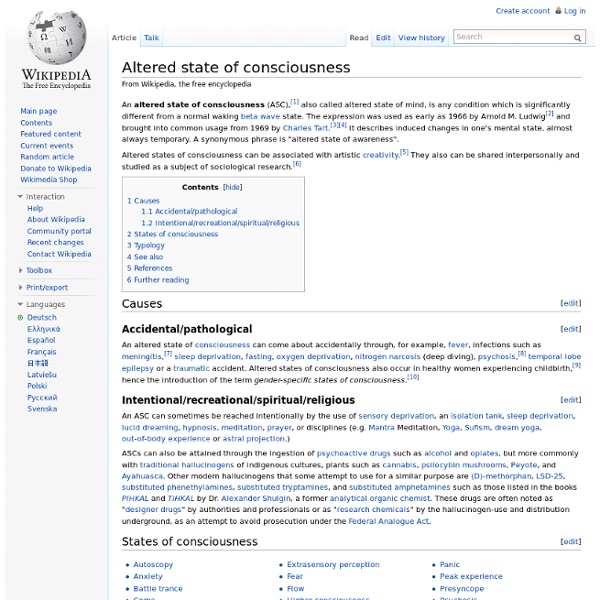American Psychological Association (APA)
The psychedelic mind expresses coherence and plasticity with all that is. It unifies the spiritual and material with a cosmic glue that sticks and drips with a smiley smile
The psychedelic mind expresses coherence and plasticity with all that is. It unifies the spiritual and material with a cosmic glue that sticks and drips with a smiley smile. External Stimuli : www.mars-1.com, MARS 1 flickr Themes : Art Nodes : creamy, dreamy, Mario Martinez, MARS 1, Painting, psychedelic, taffy
Aporia
From Wikipedia, the free encyclopedia State of puzzlement or expression of doubt, in philosophy and rhetoric In philosophy, an aporia (Ancient Greek: ᾰ̓πορῐ́ᾱ, romanized: aporíā, lit. 'literally: "lacking passage", also: "impasse", "difficulty in passage", "puzzlement"') is a conundrum or state of puzzlement. In rhetoric, it is a declaration of doubt, made for rhetorical purpose and often feigned. Philosophy[edit] In philosophy, an aporia is a philosophical puzzle or a seemingly irresoluble impasse in an inquiry, often arising as a result of equally plausible yet inconsistent premises (i.e. a paradox). In Pyrrhonism, aporia is intentionally induced as a means of producing ataraxia. Contemporary academic studies of the term further characterize its usage in philosophical discourses. 1. The aporia, or "apory" of this syllogism lies in the fact that, while each of these assertions is individually conceivable, together they are inconsistent or impossible (i.e. they constitute a paradox).
The Cognitive Costs of Multitasking
By Kendra Cherry Updated May 22, 2015. Quick Overview: Multitasking can reduce productivity by approximately 40-percent according to some researchers.Switching from one task to another makes it difficult to tune out distractions and can cause mental blocks that can slow you down. Is All That Multitasking Really Making You More Productive? Take a moment and think about all of the things you are doing right now. Perhaps you're also listening to music, texting a friend, checking your email in another browser tab, or playing a computer game. If you are doing several different things at once, then you may be what researchers refer to as a "heavy multitasker." In the past, many people believed that multitasking was a good way to increase productivity. continue reading below our video Play Video Recent research, however, has demonstrated that that switching from one task to the next takes a serious toll on productivity. What the Research on Multitasking Suggests Learn more about: References
The Jungle Prescription
Alertness
State of active attention by high sensory awareness such as being watchful Alertness is a state of active attention characterized by high sensory awareness. Someone who is alert is vigilant and promptly meets danger or emergency, or is quick to perceive and act. Lack of alertness is a symptom of a number of conditions, including narcolepsy, attention deficit disorder, chronic fatigue syndrome, depression, Addison's disease, and sleep deprivation. The word is formed from "alert", which comes from the Italian all'erta (on the watch, literally: on the height; 1618). Importance and difficulty[edit] Biological pathways[edit] Neurotransmitters that can initiate, promote, or enhance wakefulness or alertness include serotonin, (nor)epinephrine, dopamine (e.g. blockade of dopamine reuptake), glutamate, histamine, and acetylcholine. Wakefulness depends on the coordinated effort of multiple brain areas. Beta power has been used as an indicator of cortical arousal or alertness by several studies.
Freud's Conscious and Unconscious Mind
By Kendra Cherry Updated December 17, 2015. Psychoanalyst Sigmund Freud believed that behavior and personality derives from the constant and unique interaction of conflicting psychological forces that operate at three different levels of awareness: the preconscious, the conscious, and the unconscious. What do these terms mean? What exactly happens at each level of awareness? The Mind According to Freud Many of us have experienced what is commonly referred to as a Freudian slip. These misstatements are believed to reveal underlying, unconscious thoughts or feelings. James has just started a new relationship with a woman he met at school. If you were in this situation, how would you explain this mistake? The psychoanalytic view holds that there are unconscious, inner forces outside of your awareness that are directing your behavior. continue reading below our video Play Video Sigmund Freud was the founder of psychoanalytic theory. Freud's Three Levels of Mind
Welcome to the DMT-Nexus
APZ questionnaire
From Wikipedia, the free encyclopedia ^ Studerus, E., Gamma, A., & Vollenweider, F. X. (2010). Psychometric evaluation of the altered states of consciousness rating scale (OAV). PLOS ONE, 5(8), e12412. doi:10.1371/journal.pone.0012412^ Dittrich, A. (1998).
Consciousness
1. History of the issue Questions about the nature of conscious awareness have likely been asked for as long as there have been humans. Neolithic burial practices appear to express spiritual beliefs and provide early evidence for at least minimally reflective thought about the nature of human consciousness (Pearson 1999, Clark and Riel-Salvatore 2001). Nonetheless, some have argued that consciousness as we know it today is a relatively recent historical development that arose sometime after the Homeric era (Jaynes 1974). Although the words “conscious” and “conscience” are used quite differently today, it is likely that the Reformation emphasis on the latter as an inner source of truth played some role in the inward turn so characteristic of the modern reflective view of self. By the beginning of the early modern era in the seventeenth century, consciousness had come full center in thinking about the mind. Locke's contemporary G.W. 2. 2.1 Creature Consciousness Sentience. Wakefulness. 3.



